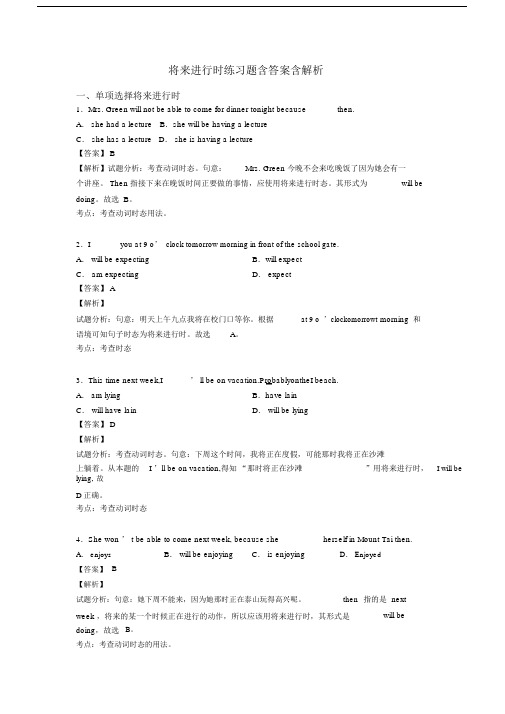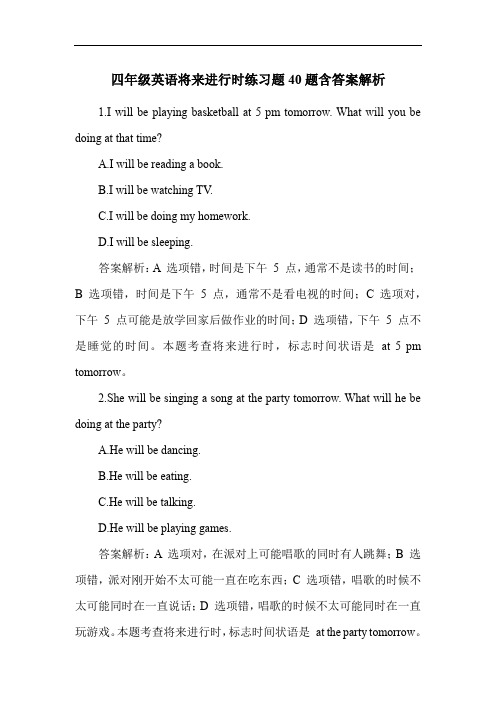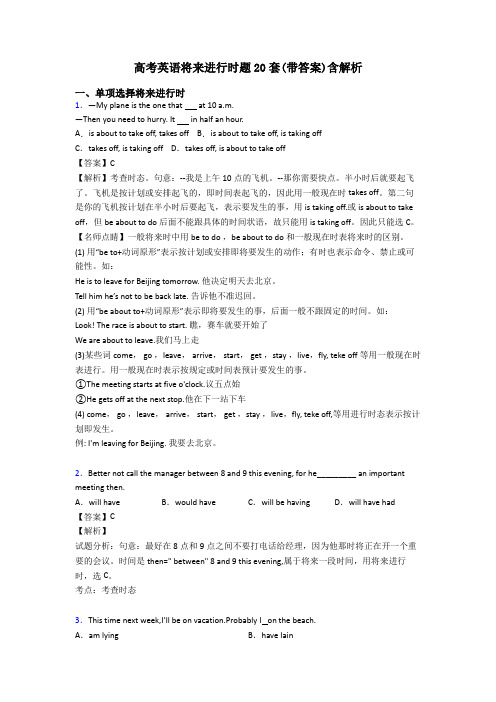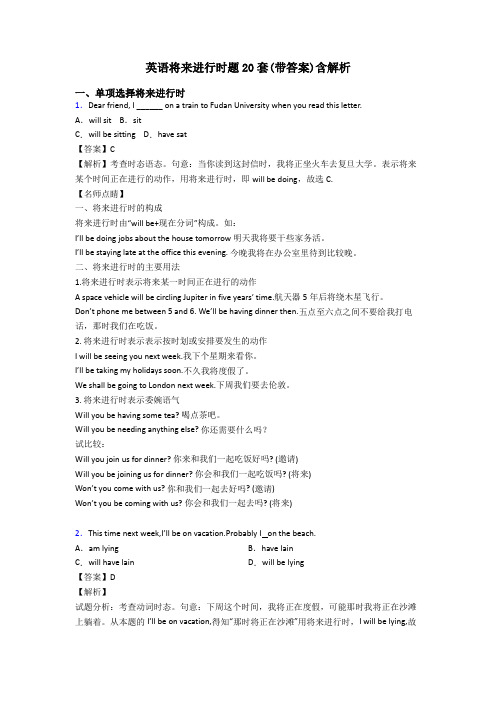英语将来进行时专项习题及答案解析含解析
高一英语将来进行时专项训练100(附答案)及解析

A.Well, I really must be going now.B.I wonder if you could let me go now.
C.Do you mind if I leave now?D.What a shame that I want to go now!
13.—I heard Mr. Morgan would be here at 4:00 pm. next Thursday.
—No, he _____ at that time.
A.was boarding B.would be boarding
C.will be boarding D.is boarding
A.takeB.took
C.was takingD.will be taking
【答案】D
【解析】
句意:---您要参加下周的音乐会吗?---我愿意去,但是我那时将正在考试。then和next week表示下周的此时此刻,为将来进行时的标志词,故选D。
7.--- I’ll come to see your performance at 9:00 tomorrow evening.
15.- If you see Sally,can you ask her to phone me?
一Sure.I ___ her this evening,so I'll tell her then.
A.will be seeingB.will have seen
C.would seeD.have seen
C.have gone D.will be going
【答案】D
【解析】考查时态。句意:——不用专门为我去取衣服。——没关系。反正我都要去商店。由第一句可知,去取衣服是还没有发生的事情,由此可知,去商店是将来的事情,故D选项正确。D选项的将来进行时相当于一般将来时。
将来进行时练习题含答案含解析.docx

将来进行时练习题含答案含解析一、单项选择将来进行时1.Mrs. Green will not be able to come for dinner tonight because ______ then.A. she had a lecture B.she will be having a lectureC. she has a lecture D. she is having a lecture【答案】 B【解析】试题分析:考查动词时态。
句意:Mrs. Green 今晚不会来吃晚饭了因为她会有一个讲座。
Then 指接下来在晚饭时间正要做的事情,应使用将来进行时态。
其形式为will bedoing。
故选 B。
考点:考查动词时态用法。
2.I ______ you at 9 o’ clock tomorrow morning in front of the school gate.A. will be expecting B.will expectC. am expecting D. expect【答案】 A【解析】试题分析:句意:明天上午九点我将在校门口等你。
根据at 9 o ’clockomorrowt morning 和语境可知句子时态为将来进行时。
故选A。
考点:考查时态3.This time next week,I’ ll be on vacation.ProbablyontheI beach.A. am lying B.have lainC. will have lain D. will be lying【答案】 D【解析】试题分析:考查动词时态。
句意:下周这个时间,我将正在度假,可能那时我将正在沙滩上躺着。
从本题的I ’ll be on vacation,得知“那时将正在沙滩”用将来进行时,I will be lying, 故D正确。
考点:考查动词时态4.She won ’ t be able to come next week, because she _________ herself in Mount Tai then.A. enjoys B. will be enjoying C. is enjoying D. Enjoyed【答案】B【解析】试题分析:句意:她下周不能来,因为她那时正在泰山玩得高兴呢。
四年级英语将来进行时练习题40题含答案解析

四年级英语将来进行时练习题40题含答案解析1.I will be playing basketball at 5 pm tomorrow. What will you be doing at that time?A.I will be reading a book.B.I will be watching TV.C.I will be doing my homework.D.I will be sleeping.答案解析:A 选项错,时间是下午5 点,通常不是读书的时间;B 选项错,时间是下午5 点,通常不是看电视的时间;C 选项对,下午5 点可能是放学回家后做作业的时间;D 选项错,下午5 点不是睡觉的时间。
本题考查将来进行时,标志时间状语是at 5 pm tomorrow。
2.She will be singing a song at the party tomorrow. What will he be doing at the party?A.He will be dancing.B.He will be eating.C.He will be talking.D.He will be playing games.答案解析:A 选项对,在派对上可能唱歌的同时有人跳舞;B 选项错,派对刚开始不太可能一直在吃东西;C 选项错,唱歌的时候不太可能同时在一直说话;D 选项错,唱歌的时候不太可能同时在一直玩游戏。
本题考查将来进行时,标志时间状语是at the party tomorrow。
3.We will be having a picnic in the park tomorrow. What will they be doing then?A.They will be swimming.B.They will be running.C.They will be having a picnic too.D.They will be playing football.答案解析:A 选项错,在公园野餐时不太可能同时在游泳;B 选项错,野餐时不太可能同时在跑步;C 选项对,有可能他们也在野餐;D 选项错,野餐时不太可能同时在踢足球。
高考英语将来进行时题20套(带答案)含解析

高考英语将来进行时题20套(带答案)含解析一、单项选择将来进行时1.—My plane is the one that at 10 a.m.—Then you need to hurry. It in half an hour.A.is about to take off, takes off B.is about to take off, is taking offC.takes off, is taking off D.takes off, is about to take off【答案】C【解析】考查时态。
句意:--我是上午10点的飞机。
--那你需要快点。
半小时后就要起飞了。
飞机是按计划或安排起飞的,即时间表起飞的,因此用一般现在时takes off。
第二句是你的飞机按计划在半小时后要起飞,表示要发生的事,用is taking off.或is about to take off,但be about to do 后面不能跟具体的时间状语,故只能用is taking off。
因此只能选C。
【名师点睛】一般将来时中用be to do ,be about to do和一般现在时表将来时的区别。
(1) 用“be to+动词原形”表示按计划或安排即将要发生的动作;有时也表示命令、禁止或可能性。
如:He is to leave for Beijing tomorrow. 他决定明天去北京。
Tell him he’s not to be back late. 告诉他不准迟回。
(2) 用“be about to+动词原形”表示即将要发生的事,后面一般不跟固定的时间。
如:Look! The race is about to start. 瞧,赛车就要开始了We are about to leave.我们马上走(3)某些词come, go ,leave, arrive, start, get ,stay ,live,fly, teke off等用一般现在时表进行。
英语将来进行时专项含解析

A.has deliveredB.has been deliveringC.will be deliveringD.delivers
【答案】C
考查时态,根据上句中在下午七点接你怎么样?答语为好吧,到那个时候我将已经从工作回来了,在家正等着你呢。等的动作在将来且正在进行,所以使用将来进行时,故选A。
7.--- I’ll come to see your performance at 9:00 tomorrow evening.
--- I’m sorry, but by then my performance ____ and I ____ reporters in the meeting room.
【答案】D
【解析】考查将来进行时。由时间状语at this time tomorrow(明天这个时候),可知表达的是将来的时间,要用将来时态。句意:明天这个时候这位教授会在会上谈论如何保护濒危动物的话题。可知是将来某个时间一定会发生的动作,是将来进行时态的用法,故选D。
【名师点睛】将来进行时主要表示将来某一时间正在进行的动作;或表示要在将来某一时间开始,并继续下去的动作,一般用延续性动词表示。典型用法有:表示在将来某一时间正在进行的动作;表示预定的将来动作或对将来的预测,并非人为安排。
请你明天下午来吧,明天上午我有一个会议。
4.表结果。
Stop the child or he will be falling over.
制止那孩子,要不他会掉下去。
5表示对将来的打算(区别于对将来的预测)。
英语将来进行时题20套(带答案)含解析

—It’s OK. I ________ to the shop anyway.
A.was going B.will have gone
C.have gone D.will be going
—Sorry. Ia report on it then.
A.will be writingB.have been writing
C.have writtenD.will have written
【答案】A
【解析】
试题分析:句意:--鲍勃,我今晚可以用你的电脑吗?--抱歉。我那时候正在用着。根据语境可知此处表示将来某个时间正在进行的动作,故用将来进行时,选A。
我们什么时候再见面?
3.表示原因。
Please come tomorrow afternoon,I'll be having a meeting tomorrow morning.
请你明天下午来吧,明天上午我有一个会议。
4.表示结果。
Stop the child or he will be falling over.
【答案】C
【解析】考查时态语态。句意:当你读到这封信时,我将正坐火车去复旦大学。表示将来某个时间正在进行的动作,用将来进行时,即will be doing,故选C.
【名师点睛】
一、将来进行时的构成
将来进行时由“will be+现在分词”构成。如:
I’ll be doing jobs about the house tomorrow明天我将要干些家务活。
A.will meetB.am about to meet
英语将来进行时专项及解析
英语将来进行时专项及解析一、单项选择将来进行时1.—Have you heard from Jane recently?—No,but I ________ her over Christmas.A.saw B.will be seeingC.have seen D.have been seeing【答案】B【解析】考查时态。
句意:——你最近收到Janet的来信吗?——没有,但是我将在圣诞节看到她。
第一句中用了have,而第二句回答No,所以说话人近来都没有Janet的消息,而A、C、D 都表示有她的消息,所以只能选B,表示将来进行时。
故选B。
2.She won’t be able to come next week, because she _________ herself in Mount Tai then. A.enjoys B.will be enjoying C.is enjoying D.Enjoyed【答案】B【解析】试题分析:句意:她下周不能来,因为她那时正在泰山玩得高兴呢。
then指的是next week,将来的某一个时候正在进行的动作,所以应该用将来进行时,其形式是will be doing,故选B。
考点:考查动词时态的用法。
3.My brother and some of his classmates ______ as volunteers to help the elderly in the old-age home during the winter holiday to come.A.worked B.are workingC.will be working D.have been working【答案】C【解析】试题分析:考查句子时态的使用。
be+doing现在进行时;will+be+doing将来进行时;have been doing 是现在完成进行时。
句意:我的哥哥和他的一些同学在这个即将到来的寒假期间,将会以一名志愿者的身份去帮助老人院的老人。
将来进行时练习全集及解析
将来进行时练习全集及解析一、单项选择将来进行时1.After the present repairing work, workers ________ the testing and the fire alarm bell________ intermittently by the time we start a new term.A.is conducting; will ringB.will soon conduct; will have rangC.will soon be conducting; will have rangD.will soon be conducting; will be ringing【答案】C【解析】试题分析:句意:当前的维修工作之后,工人们会很快进行测试,消防警铃会一直的响到我们开始新学期时。
根据句意第一空表示将来正在做某事,第二空将来完成,故选C。
考点:考查时态。
2.Better not call the manager between 8 and 9 this evening, for he_________ an important meeting then.A.will have B.would have C.will be having D.will have had【答案】C【解析】试题分析:句意:最好在8点和9点之间不要打电话给经理,因为他那时将正在开一个重要的会议。
时间是then=" between" 8 and 9 this evening,属于将来一段时间,用将来进行时,选C。
考点:考查时态3.—Can you meet me at the airport at 9 o’clock next Monday?— I’d like to, but I ________ an English class then.A.am having B.haveC.will have D.shall be having【答案】D【解析】试题分析:考查时态。
英语将来进行时练习题20篇及解析
A.would take B.took
C.will be taking D.have taken
【答案】C
【解析】考查时态。句意:我们7月15号离开南京,那时我们要乘坐去非洲北部的摩洛哥。根据语境可知这里表示在将来的某一个时间正在进行的动作,故用将来进行时。选C。
(2)用“be about to+动词原形”表示即将要发生的事,后面一般不跟固定的时间。如:
Look! The race is about to start.瞧,赛车就要开始了
We are about to leave.我们马上走
(3)某些词come,go,leave,arrive,start,get,stay,live,fly, teke off等用一般现在时表进行。用一般现在时表示按规定或时间表预计要发生的事。
【名师点睛】
将来进行时态的结构及用法:
将来进行时由will/shall+be+现在分词构成。
通常用于表示最近或很久的将来正在进行的动作,将来进行时常用来表示说话人设想已经安排好的事。
如:I’ll be working for my exams next month.下个月我将用功看书准备考试.
By this time tomorrow, I’ll be lying on the beach.到明天的这个事件,我就躺在沙滩上了。
A.am watchingB.will be watching
C.will have watchedD.will been watched
英语将来进行时专题练习(及答案)及解析
—No,but I ________ her over Christmas.
A.saw B.will be seeing
C.have seen D.have been seeing
【答案】B
【解析】
考查时态。句意:——你最近收到Janet的来信吗?——没有,但是我将在圣诞节看到她。第一句中用了have,而第二句回答No,所以说话人近来都没有Janet的消息,而A、C、D都表示有她的消息,所以只能选B,表示将来进行时。故选B。
9.---If I come back in an hour, do you think the manager will see me?
---I’m very sorry, but he ________ a meeting then.
A.is havingB.has had
C.will be havingD.will have
考点:考查时态
4.Don’t call me tomorrow evening, for I ____________to a lecture on how to keep a good state of mind when taking an exam.
A.will listenB.shall listen
【答案】A
【解析】
考查时态。根据this time tomorrow(明天这个时候)可知此空应用将来进行时,表示明天这个时候某个动作将正在进行。
6.Just think! This time next week we ________in the sun in the south of France.
- 1、下载文档前请自行甄别文档内容的完整性,平台不提供额外的编辑、内容补充、找答案等附加服务。
- 2、"仅部分预览"的文档,不可在线预览部分如存在完整性等问题,可反馈申请退款(可完整预览的文档不适用该条件!)。
- 3、如文档侵犯您的权益,请联系客服反馈,我们会尽快为您处理(人工客服工作时间:9:00-18:30)。
一、单项选择将来进行时
1.—The new machines have arrived and are being tested in the workshop.
—I’m glad we _____ them in the years ahead.
A.will be operating B.have been operating
A.will be havingB.would have
C.will haveD.will have had
【答案】A
【解析】
【详解】
考查时态。句意:在今晚七点至八点之间你最好不要给经理打电话,因为他那时正在召开一次重要的会议。根据句子的时间状语between 7 and 8 this evening可知,句子表达的是将来的动作,根据后面从句中的then可知,还是指的是今晚七点至八点之间,所以用将来进行时。故A选项正确。
12.We all know that good results ________ for you when you start doing things you love.
A.are waiting B.have waited
C.have been waiting D.will be waiting
考点:考查句子时态的使用
4.—Will you go to Mary’s wedding party tonight?
—I’m afraid not. I _______ my brother’s.
A.will attendB.have attended
C.am attendingD.will be attending
【答案】D
【解析】
【详解】
考查时态。句意:——我听说Mr Morgan将于下周四下午4点在这里。——不,他会在那个时候登机。结合句意这里应该用一般将来时态的被动语态,故选D。
16.I am going on a dream vacation to Hawaii. While you are doing paperwork, I ________ on asunny beach.
—I’d love to,but I ________ as a volunteer in my community then.
A.will workB.have worked
C.will be workingD.was working
【答案】C
【解析】
试题分析:考查时态。本句中then那时,在上下文中指第一句中的未来时间“this Sunday morning”,所以使用将来进行时表示在将来某个时间正在进行的事情。句意:—这个星天上午我们去看电影吧!—我想去的,但是那时我作者社区里做志愿者。故C项正确。
【答案】D
【解析】
试题分析:考查时态。句意:—下周一上午9点你能到机场来接我吗?—我想去接你,但是那个时候我有一节英语课。根据句意可知表示的是在将来的某个时间点上正在进行的动作,所以使用将来进行时。故D正确。
考点:考查时态
10.--- She has been ill for a week.
----- I _____ with her at noon tomorrow.
A.would stayB.stay
C.have been stayingD.will be staying
【答案】D
【解析】
【详解】
考查时态。句意:他们就要和我们在一起呆一段时间了。for the time being意为“眼下”,表示事情会发生在不久之后,从此处用将来进行时表示从现在开始一直和我们一起呆一段时间,故D项正确。
2.By the middle of the 21stcentury, the vast majority of the world’s population _____ in cities rather than in the country.
A.are livingB.will be livingC.have livedD.will have lived
【名师点睛】将来进行时主要表示将来某一时间正在进行的动作;或表示要在将来某一时间开始,并继续下去的动作,一般用延续性动词表示。典型用法有:表示在将来某一时间正在进行的动作;表示预定的将来动作或对将来的预测,并非人为安排。
14.––Can I give you a call on Saturday morning?
【答案】B
【解析】
试题分析:考查时态。根据本句的时间状语by the middle of the 21stcentury说明是一个将来时。陈述的是在将来的这段时间里所发生的事情,所以使用将来进行时。句意:到21世纪中叶,大部分的人口都将生活在城里而不是在乡下。故B正确。
考点:考查时态
点评:时态题的考查关键是抓住句中的时间状语。要根据时间状语来选择合适的时态,在平时的学习中要注意积累有关时态的用法和各种时态的特殊之处。t me at the airport at 9 o’clock next Monday?
— I’d like to, but I ________ an English class then.
A.am havingB.have
C.will haveD.shall be having
18.---Are you going to Australia for the coming winter holiday?
---Yes. I am making the bookings. It is exciting to think about that I ____a sun-bath on the beach soon.
C.will be workingD.have been working
【答案】C
【解析】
试题分析:考查句子时态的使用。be+doing现在进行时;will+be+doing将来进行时;have been doing是现在完成进行时。句意:我的哥哥和他的一些同学在这个即将到来的寒假期间,将会以一名志愿者的身份去帮助老人院的老人。故选C。
C.Do you mind if I leave now?D.What a shame that I want to go now!
【答案】A
【解析】
6.You’d better not call the manager between 7 and 8 this evening, for he ________ an important meeting then.
C.would be operating D.had been operating
【答案】A
【解析】考查时态。句意:——新机器已经到了,正在车间里被检测。——我很高兴未来几年我们可以操作它们了。该句的时间状语为in the years ahead,是表示将来的时间,故该句应用一般将来时态。故A选项正确。A选项中的将来进行时相当于一般将来时,表示将来某个时间正在进行的动作。
3.My brother and some of his classmates ______ as volunteers to help the elderly in the old-age home during the winter holiday to come.
A.workedB.are working
【答案】D
【解析】
试题分析:考查动词的时态句意:明天我会把签订好的合同亲自给您送过去。对不起,那个时候我正在开始。根据语境可知then指的是tomorrow的这个时候,表示将来,并且这个动作正在进行,故选D项。
考点:考查动词的时态
8.—Let’s go to the cinema this Sunday morning.
A.will be studying B.had studied
C.has studied D.would study
【答案】A
【解析】
【详解】
考查时态。句意:Tom一直梦想成为一名银行家,我相信他20岁时会在大学里学习金融。“at the age of 20”标明是将来某一时间点发生的事情,应该用将来进行时,故A项正确。
7.--- I’ll send you the signed contract personally this time tomorrow.
--- Sorry, I ______ a meeting then.
A.am attendingB.attended
C.have attendedD.will be attending
【答案】D
【解析】考查时态。句意:我们都知道当你开始做你喜欢的事的时候,好的结果将会一直等你。此处表示在将来时间会一直持续的事,用will be doing。故选D。
13.48.The professor _____about how to protect the endangered animal in the conference at this time tomorrow.
A.stayedB.stayC.am stayingD.shall be staying
【答案】D
【解析】
考查时态。句意:她病了一周了。明天中午我会陪着她的。根据题中的时间at noon tomorrow,竟来某一时刻进行的动作应用将来进行时态。所以选D。
11.They ______ with us for the time being.
––I think I ______ to the mountains, so call me on my cell phone.
A.drive B.am driving
C.will drive D.will be driving
